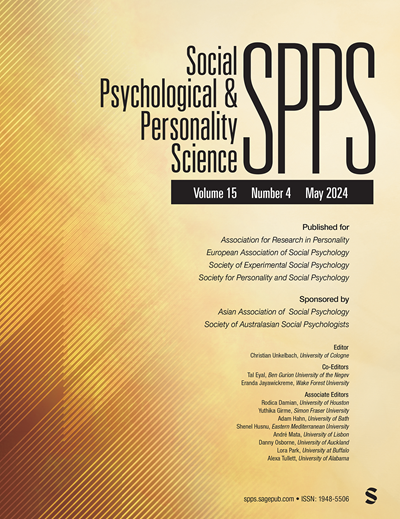Identity and Institutions as Foundations of Ingroup Favoritism: An Investigation Across 17 Countries
IF 3.3
2区 心理学
Q1 PSYCHOLOGY, SOCIAL
引用次数: 0
Abstract
Ingroup favoritism can represent a challenge for establishing cooperation beyond group boundaries. In a behavioral experiment conducted across 17 societies ( N = 3,236), we tested pre-registered hypotheses forwarded by social identity and material security frameworks to account for ingroup favoritism in trust toward national ingroups. We related individual-level measures of national identification and perception of institutions to trust, trustworthiness, and behavioral expectations of partner’s trustworthiness toward a national ingroup, outgroup, or unidentified stranger in a trust game. Our findings support a social identity framework, as national identification was positively associated with greater ingroup favoritism. However, in contrast to predictions from a material security framework, perceptions of national institutions as trustworthy and benevolent were positively associated with greater ingroup favoritism. These findings suggest some potential challenges that support for national institutions might pose to the establishment of trust beyond group borders.身份和制度作为群体偏袒的基础:一项横跨17个国家的调查
群体内偏袒可能对建立超越群体边界的合作构成挑战。在一项跨17个社会(N = 3236)进行的行为实验中,我们测试了由社会身份和物质安全框架转发的预注册假设,以解释对国家内部群体的信任中的内部群体偏好。在信任游戏中,我们将国家认同和机构感知的个人层面测量与信任、可信赖性和伙伴对国家内群体、外群体或身份不明的陌生人的可信赖性的行为期望联系起来。我们的研究结果支持社会认同框架,因为国家认同与更大的群体内偏爱呈正相关。然而,与物质安全框架的预测相反,认为国家机构值得信赖和仁慈的看法与更大的内部偏袒呈正相关。这些发现表明,支持国家机构可能对建立超越群体边界的信任构成一些潜在挑战。
本文章由计算机程序翻译,如有差异,请以英文原文为准。
求助全文
约1分钟内获得全文
求助全文
来源期刊

Social Psychological and Personality Science
PSYCHOLOGY, SOCIAL-
CiteScore
12.50
自引率
1.80%
发文量
77
期刊介绍:
Social Psychological and Personality Science (SPPS) is a distinctive journal in the fields of social and personality psychology that focuses on publishing brief empirical study reports, typically limited to 5000 words. The journal's mission is to disseminate research that significantly contributes to the advancement of social psychological and personality science. It welcomes submissions that introduce new theories, present empirical data, propose innovative methods, or offer a combination of these elements. SPPS also places a high value on replication studies, giving them serious consideration regardless of whether they confirm or challenge the original findings, with a particular emphasis on replications of studies initially published in SPPS. The journal is committed to a rapid review and publication process, ensuring that research can swiftly enter the scientific discourse and become an integral part of ongoing academic conversations.
 求助内容:
求助内容: 应助结果提醒方式:
应助结果提醒方式:


